5 Things Hollywood Gets Wrong About the Apocalypse

Hollywood seems pretty confident that at some point humanity will find itself at the mercy of a world-resetting apocalypse. Over the years, movies have provided us with a complete visual library of survival guides covering each and every possible scenario, from the plausible (the world is enslaved by sentient robot overlords) to the ludicrous (the world is poisoned by angry trees, because for some reason M. Night Shyamalan gets to keep making movies).
Unfortunately, Hollywood will leave you ill-prepared, because it has managed to completely overlook several key aspects of life on post-apocalyptic Earth. For example ...
No, Everyone Won't Immediately Turn into Crazy Assholes
According to Hollywood …
Don't Miss
Pretty much every zombie franchise from Night of the Living Dead on has taught us that humans are the real monsters in an apocalypse -- most survivors will be psychopaths who are more dangerous than the undead. The Road tells us that even the good guy isn't necessarily a "good guy" when he's doing what he thinks is necessary to survive, and that literally everyone else is a rapist or a cannibal or both. War of the Worlds showed us that Tom Cruise isn't afraid to beat Tim Robbins to death to keep his daughter safe. World War Z showed us that Brad Pitt can run like Tom Cruise.
The lesson is always the same: When society breaks down, the remaining humans treat the world as a nonstop cannibalistic rape festival.
But Actually ...
Ask yourself this: If humans naturally become murderous sociopaths in the absence of modern society, then how did modern society ever form in the first place?
The whole freaking reason we have a civilization for the zombies to destroy is because humans are naturally cooperative. You don't need to take our word for it -- studies performed by researchers at Harvard and Yale found that our basic human nature dictates an overwhelming need to cooperate with other humans, even if said cooperation results in some measure of harm to ourselves. Biologists say the same thing. Despite what the self-checkout line at Harris Teeter may have led you to believe, humans actually give a decent-sized shit about one another.
In regional crises like Atlanta's blizzard-induced traffic gridlock and Hurricane Sandy, examples of basic human kindness weren't difficult to find. When serious tragedy hits a community, most people's first impulse is to see what they can to do help their neighbors, rather than to carry all of their canned food into the basement and start loading their shotguns. It's not even because we're nice guys -- it's because instinctively we know that we might need that person down the road. So even if some worldwide crisis were to transform us all into selfish mutants, the theory of reciprocal altruism suggests that we'd probably still be willing to share that can of beanie weenies if it meant we could get something in return later, even if that something is just "an extra person I can feed to the zombies to make my getaway."
That's the biggest thing missing from a show like The Walking Dead or a movie like The Road: commerce. They shouldn't have to scavenge in vacant houses for food or medicine; somebody should be going camp to camp selling that shit in exchange for bullets, sex, protection, or whatever. Hell, even monkeys can figure that out.
The Apocalypse Itself Is the Least of Your Problems
According to Hollywood ...
Every apocalypse movie can be boiled down to this:
"Almost everyone has been killed by ______, so now some survivors must fight the _______ and maybe the other survivors who turned out to be assholes."
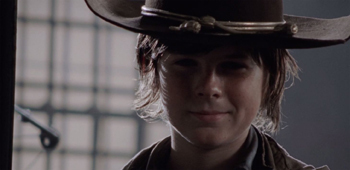
And that's the same whether the blank is filled in by zombies, robots, or inclement weather. The number one cause of death in The Walking Dead universe is getting eaten by a zombie, and the number two cause of death is getting murdered by a psychopath. Those who survive are the ones who best learn to adapt to those threats.
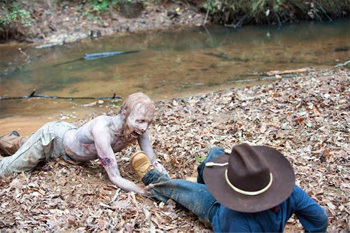
But Actually ...
Some apocalypse stories involve diseases wiping everyone out (like Contagion or Stephen King's The Stand), but in reality, that would be every apocalypse.
Think of it this way: In the American Civil War, only 1 out of every 3 deaths was caused by getting shot or blown apart by a cannon. The rest were caused by disease. Today, 85 percent of American military medical evacuations from the Middle East are the result of non-battle injuries and disease. In other words, the moment you remove someone from everyday health care and hygiene, you find out that sickness and infections are the real apocalypse. So, for millions upon millions of people, the crisis would be "I can't treat my chronic, debilitating illness anymore," not "My zombie neighbor Chad is trying to eat me again."
For example, about 20 million Americans have diabetes and require medication to control it, not to mention another 7 million or so who haven't been diagnosed. Around 3 million have Type 1, which means they need insulin shots every single day to live. What the hell are they supposed to do once Godzilla tramples their local health care provider into radioactive dust? What about the 26 million who have asthma?
It gets worse. Close to half a million Americans require dialysis on a weekly basis. There were around 1.6 million new cancer patients in 2014 alone (that's new cancer patients, in addition to the countless millions already coping with some form of the disease). How about the 12.7 million people with COPD, a serious respiratory illness, or the scores of people awaiting an organ transplant? Or the 1.3 million living in nursing homes? Or the people being treated for serious psychological disorders?
Conquering the robotic zombie monsoon isn't going to make much of a difference to them when they aren't going to live through the week regardless of what happens. In the Walking Dead universe, it should be fairly rare to run into someone who actually lost their whole family to zombie bites -- the far more common story would be "The zombies overran Walgreens and Mom couldn't get her pills refilled."
Gasoline Goes Bad (Quickly)
According to Hollywood ...
One of the cool things about the post-apocalypse is being able to tear around the countryside in a kickass vehicle with big-ass guns strapped to it, like the human resistance in the Terminator movies:
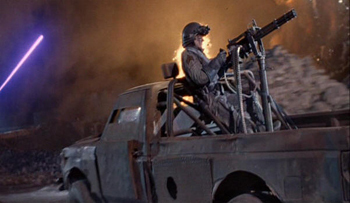
Or in The Road Warrior, which takes place in a universe where muscle cars are more important than food or pants. Even drowning the Earth in seawater, dinosaur fish, and Kevin Costner's terrible acting in Waterworld didn't do much to lessen the remaining population's dependence on the bubbling crude, with the bad guys zipping around on Jet Skis.
Sure, all of these take place several decades in the future, but you figure there's enough gasoline sitting around in storage tanks and such that the reduced population can happily go around ramping shit with abandon. And don't they make a point of fighting over the dwindling supplies?
But Actually ...
Finding some gasoline a decade after the apocalypse would be no more helpful than finding an old jug of milk. Both go bad over time, and at least you can make cheese or something with the latter.
While you might conceivably spend the first several months after the apocalypse riding your motorcycle through the smoldering remains of civilization, it won't long before cars (and anything else with an internal combustion engine) are reduced to nothing more than potential hiding spots from patrolling maniacs. Gasoline is a highly refined product, and that means it degrades over time. The more volatile elements gradually evaporate, and the gasoline begins to oxidize, which is another way of saying that any car, boat, or plane left with gas sitting in it through the apocalypse will rust from the inside out in relatively short order.
Your best bet is to keep a stockpile of gas in airtight containers and pump it full of fuel stabilizer, but even then you're only delaying the inevitable, sort of like putting a flower in a vase of water or watching the first two Back to the Future movies. After the first year or two, everyone would be bombing around on roller skates and bicycles, which admittedly would've changed the entire tone of The Road Warrior.
Society Has Made You Forget How to Feed Yourself
According to Hollywood ...
You know that, after the apocalypse hits, you'll be able to scrounge around for all the prepackaged food that society left behind. And you know that eventually all those Twinkies and frozen burritos are going to run out, and then you'll have to learn how to hunt squirrels and cats in between vast treks across endless landscapes of desiccated wilderness, like Denzel Washington in The Book of Eli.
And sure, you know that the reason everyone looks so healthy in these movies is that Hollywood isn't going to force the cast to starve themselves just to make it authentic, but you still figure that a resourceful person could live off the land for however long they needed, or at least until we could figure out how to take out the one alien ship that will make all of the other ships and foot soldiers spontaneously explode.
But Actually ...
Hey, ever heard of scurvy? That horrific disease old-timey sailors got because they weren't getting enough vitamin C? Where are you getting your citrus in the post-apocalyptic future, after your grocery store is no longer trucking in oranges from Florida and California? Famine is one of the Four Horsemen of the Apocalypse, but his skinnier, nerdier little brother Malnutrition is definitely an alternate on the team.
We're told that Denzel is able to survive by being a badass hunter, but anyone following a strict diet of woodland creatures would quickly start feeling the effects of micronutrient deficiency, which is a delightful term used to refer to the litany of diseases that stem from not getting enough vitamins and minerals. It is important to note that not a single one of those deficiencies will give you blind superpowers.
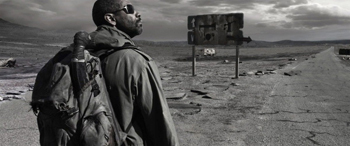
You see, right now we've got the FDA monitoring everything we cram into our faceholes, making sure we get critical things like iron, iodine, vitamin A, folate, and zinc from our prepackaged meals. The vast majority of us don't have any idea what foods actually contain those things and how much of them we need to survive. Without those nutrients, you're in for some spectacularly terrible consequences, including anemia, skin rashes, and a decreased ability to fight infection. That lair of zombies you erased with Molotov cocktails last week might've just been a group of regular people who'd had nothing to eat but pizza rolls for the last eight months.
In other words, your problem isn't just finding food -- it's finding the right food. That means shooting things with a bow and arrow isn't going to cut it, because your body requires carbohydrates, protein, fats, vitamins, and minerals, and at least one of those things doesn't come from the flesh of an animal, no matter how delicious its fear tastes. The apocalypse is going to have much more to do with trial-and-error farming than learning how to poach the scant remaining wildlife, and good luck working the land while you're depressed, shivering, and shitting your stomach inside-out from malnutrition.
TheWorld Is Full of Giant Ticking Bombs
According to Hollywood ...
The characters in every post-apocalyptic movie are always worried about zombies, road gangs, aliens, robots, super volcanoes, or any combination thereof. You almost never see them worried about literally everything exploding, unless it's as a direct result of a death ray or an earthquake or something. The world has already ended, right? What's left to go wrong?
But Actually ...
Let's start with the nuclear power plants.
If the History Channel is to be believed (and, hey, why shouldn't it be?), you've only got about 10 motherf*cking days after civilization shuts down until the radioactive fuel rods at every nuclear power plant in the world evaporate the water from their cooling pools and start belching out massive clouds of prolonged radioactive death.
Here's a map of all 62 of the nuclear power plants in the United States:
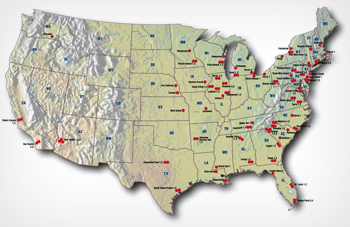
More than half of those power plants have two or more nuclear reactors, bringing the grand total to more than 100 reactors spread across 31 states. And Europe is much, much worse -- a similar map of their power plants looks like the crotch of an angry sailor:
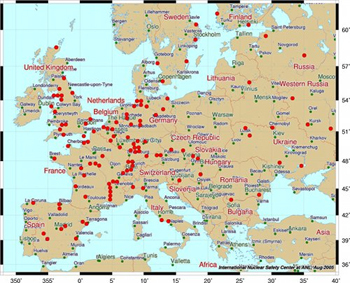
The Nuclear Regulatory Commission has set up emergency planning zones (EPZs) around each nuclear power plant, defining the minimum safe distances in the event of a nuclear meltdown. They vary in size from plant to plant, but consist of two distinct zones: a plume exposure EPZ, with a radius of about 10 miles from the reactor (a distance within which about 6 million Americans live), and an ingestion pathway EPZ, which has a radius of about 50 miles and contains around 120 million Americans. Basically, unless you can make it to the Rockies within two weeks after Mothra destroys the White House, you're going to be bathed in an explosion of radioactive mist.
But the nuclear plants are just the beginning. Here's what it looks like when a natural gas line explodes ...
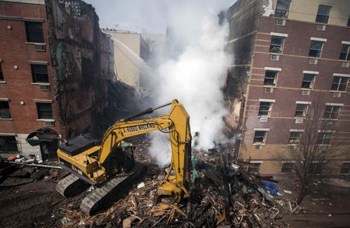
... and you've got one of those running into almost every structure in the modern world.
And then you've got the industrial sites: Pipes and holding tanks rust and spring leaks, and with no crews to maintain them, every refinery and factory in the world is one spark or lightning bolt away from becoming a city-consuming ball of fire. And it's not just the ones dealing with volatile chemicals, either -- we've already talked about how everything from powdered milk to batteries can suddenly become tiny antipersonnel mines under the right conditions. Even grain silos can turn into a smoking crater at a moment's notice. The post-apocalypse, in other words, would make you feel like you'd been Inceptioned inside Michael Bay's most erotic dream.
Actually, why don't movies include this part?
Related Reading: The apocalypse may nearly be here right now, that giant Jesus statue in Rio just got struck by lightning. If you'd like a look at the post-apocalypse today, check out this abandoned Disney waterpark. It's probably a good idea to brush up on your apocalypse-surviving strategies. We can help.